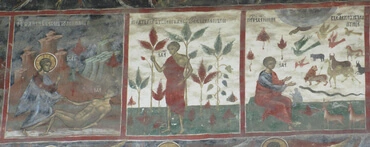Explanation of Genesis 2:19
By Brian David

The people of the Most Ancient Church had begun wanting to lead themselves and think from themselves instead of from the Lord. The Lord knew it would be their downfall, and sought to fulfill them through the spiritual gifts they already had in their celestial state.
Here we see the Lord showing them the presence in themselves (the ground) of all the beautiful things of their state: affections springing from love to the Lord (the beasts of the field), thoughts inspired by mutual love (fowl of the air) and all other spiritual activity filled with life from the Lord (living creatures). And theses things were gifts; the fact that the people were invited to name the animals means they were shown the nature of all those wonderful things.
(References: Arcana Coelestia 142, 143, 144, 145)
Arcana Coelestia #5786
5786. Behold we are servants to my lord. That this signifies that they are forever to be deprived of freedom of their own, is evident from the signification of “servants,” as being to be without freedom from their own (see n. 5760, 5763). What it is to be deprived of freedom from their own has also been told in the numbers cited; but as this is a matter of the greatest moment, it shall be stated again. There is an external man, and there is an internal; the external man is that through which the internal acts; for the external is only an organ or instrument of the internal. This being so, the external must be wholly subordinate and subject to the internal; and when it is subject, heaven acts through the internal into the external, and disposes it according to such things as are of heaven.
[2] The contrary takes place when the external is not subject, but rules, as it does when the man has as his end the pleasures of the body and of the senses, especially those of the love of self and the world, and not those of heaven. To have as the end is to love the one and not the other; for when a man has such things as the end, he no longer believes that there is any internal man, nor that there is anything in himself which is to live when the body dies. For his internal, not having rule, merely serves the external to enable it to think and reason against good and truth, because in this case no other influx through the internal is open. For this reason it is that such persons wholly despise, and even turn away from, the things that are of heaven. From these things it is clear that the external man, which is the same as the natural man, ought to be entirely subject to the internal which is spiritual, and consequently to be without freedom from its own.
[3] Freedom from one’s own is to indulge in pleasures of every kind, to despise others in comparison with oneself, to subject them to oneself as servants, or else to persecute and hate them, to delight in evils that befall them, and more so in those which the man himself brings on them purposely or deceitfully, and to desire their death. Such are the results of freedom from one’s own. It is plain therefore what a man is when he is in this freedom, namely, a devil in human form. But when he loses this freedom, he then receives from the Lord heavenly freedom, which is utterly unknown to those who are in freedom from their own. These suppose that if the latter freedom were taken away from them, they would have no life left; when in fact life itself then begins; and joy, bliss, happiness, with wisdom, then come, because this freedom is from the Lord.






